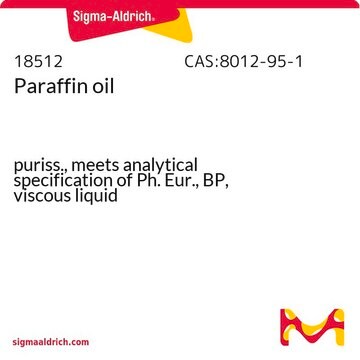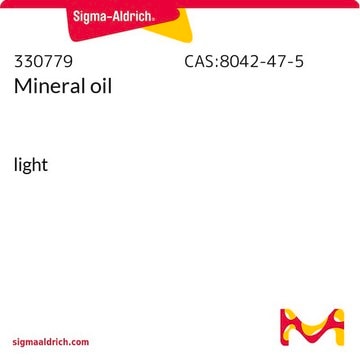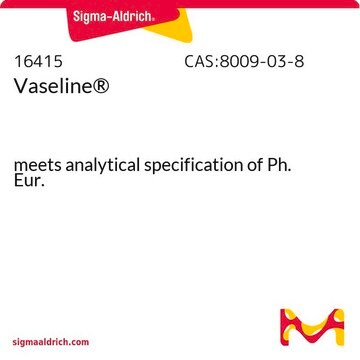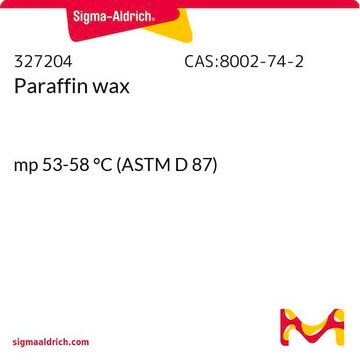Recommended Products
form
oil
Quality Level
technique(s)
IR spectroscopy: suitable
refractive index
n20/D 1.473
viscosity
100-145 mPa.s(20 °C)
bp
300 °C (lit.)
mp
-24 °C (lit.)
Looking for similar products? Visit Product Comparison Guide
Related Categories
General description
Paraffin oil resists water. It is widely used as release agent, lubricant, defoamer and also as coating component.
Application
Paraffin oil has been used in preparation of tyrosinase-modified carbon paste electrode for detection of Catechol.
Signal Word
Danger
Hazard Statements
Precautionary Statements
Hazard Classifications
Asp. Tox. 1
Storage Class Code
10 - Combustible liquids
WGK
WGK 2
Flash Point(F)
419.0 °F - closed cup
Flash Point(C)
215 °C - closed cup
Personal Protective Equipment
dust mask type N95 (US), Eyeshields, Gloves
Choose from one of the most recent versions:
Already Own This Product?
Find documentation for the products that you have recently purchased in the Document Library.
Rate-limiting steps of tyrosinase-modified electrodes for the detection of catechol.
Burestedt E
Analytical Chemistry, 68(9), 1605-1611 (1996)
Eryn Slankster et al.
Scientific reports, 10(1), 3119-3119 (2020-02-23)
Starvation enhances olfactory sensitivity that encourage animals to search for food. The molecular mechanisms that enable sensory neurons to remain flexible and adapt to a particular internal state remain poorly understood. Here, we study the roles of GABA and insulin
Jyothi C Abbar et al.
Bioelectrochemistry (Amsterdam, Netherlands), 83, 1-7 (2011-07-26)
The electrochemical oxidation of a hemorheologic drug, pentoxifylline was investigated at a multi-walled carbon nanotubes-paraffin oil paste electrode using cyclic and differential pulse voltammetry. The oxidation process was irreversible over the pH range studied and exhibited an adsorption-controlled behavior. All
Maria Koliou et al.
European journal of pediatrics, 169(7), 833-838 (2009-12-18)
Information on childhood poisonings in Cyprus is limited. Our objective was to examine the epidemiology of poisonings among children in Cyprus. All children up to 15 years of age admitted for poisoning to the Archbishop Makarios Hospital in Nicosia, Cyprus
Ozlem Yigit et al.
The Journal of emergency medicine, 42(4), 417-419 (2010-12-24)
Fire-eater's pneumonia is a chemical pneumonitis that can develop after accidental aspiration of liquid hydrocarbon-based fuel during a flame-blowing or a fire-eating performance. Typical findings of the patient are similar with any infectious pneumonia: chest pain, shortness of breath, cough
Our team of scientists has experience in all areas of research including Life Science, Material Science, Chemical Synthesis, Chromatography, Analytical and many others.
Contact Technical Service